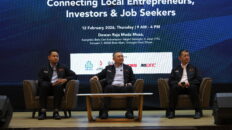KUALA LUMPUR, May 8 – Microsoft released its 2025 Work Trend Index today, and it shows a decisive shift in how organizations across Malaysia are currently adopting AI-driven intelligent agents to address growing capacity challenges and reshape the workforce. The findings shown has placed Malaysia as a front-runner in AI transformation across Asia, with both leadership and employees embracing the future of work via integration.
However, the report does highlight a pressing capacity crisis, with 83% of Malaysia’s workforce reporting insufficient time or energy to complete their work. Meanwhile, 61% of leaders say workload will increase until productivity improves. Microsoft 365 telemetry data reinforces this, showing that employees are interrupted on average every two minutes by meetings, emails, or digital notifications.
As retaliation, Malaysian leaders are accelerating AI adoption. 89% say 2025 is a pivotal year to overhaul strategies and operations, and 86% are confident in integrating AI agents into their organizations to expand workforce capacity within the next 12 to 18 months – both figures exceed global averages.
“Malaysia is stepping up as a regional leader in AI transformation – and the latest Work Trend Index findings affirm that,” said Laurence Si, Managing Director of Microsoft Malaysia. “With 86% of business leaders confident in using AI agents and more than half already automating workstreams, Malaysia is showing how ambition can scale into action.”
Redefining the Organizational Chart
The report highlights a shift from traditional hierarchical structures to fluid “Work Charts”, where teams form around outcomes rather than static departments. With AI agents acting as research assistants, creative partners, or data analysts, companies can assemble lean, agile teams on demand.
Currently, 51% of Malaysian leaders say they are using AI agents to fully automate workstreams or business processes, surpassing the global average of 46%.
Employees also report turning to AI for its unique advantages, including:
- 24/7 availability (44%)
- Machine speed and quality (35%)
- Unlimited idea generation (31%)
Rise of the Frontier Firm
Microsoft’s report also introduces us the concept of the Frontier Firm – organizations powered by hybrid teams of humans and AI agents. These firms are twice as likely to thrive, innovate faster, and handle greater workloads.
In Malaysia, 92% of Frontier Firm workers report having opportunities to do meaningful work, and 58% say they can take on more work – both figures well above the Asia-Pacific average (77% and 21%, respectively).
Over the next 12 to 18 months, Malaysian workers expects the following with high hopes:
- 44% of Malaysian leaders say expanding capacity with digital labor is a top priority.
- 48% prioritize upskilling to support the AI transition.
- 84% are considering new AI-focused roles like AI agent specialists, trainers, and workforce managers.
Upskilling for the AI-Powered Future
While business leaders lead in AI adoption (68% highly familiar with agents), only 39% of employees report the same. To close this gap:
- 59% of Malaysian managers expect AI training to become a core responsibility in the next five years.
- Leaders anticipate broader scopes for their teams, including:
- Redesigning business processes with AI (40%)
- Building multi-agent systems (46%)
- Training and managing AI agents (48% and 44%)
Looking Ahead
Malaysia’s early AI adoption is poised to deliver long-term competitive advantages in innovation, efficiency, and talent development. As organizations begin to operate like AI-powered startups, the ability to delegate and manage intelligent agents will become a key leadership skill.
“AI is more than a shift in tools. It’s a strategic transformation woven into the fabric of the modern workplace,” said Si. “Malaysia is emerging as a model for how AI-powered organizations can transform productivity, empower talent, and lead in the digital economy.”
For more information, visit: https://www.microsoft.com/en-my/work-trend-index









